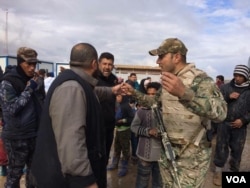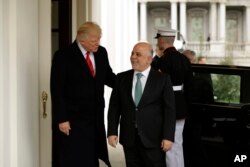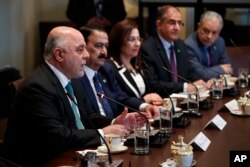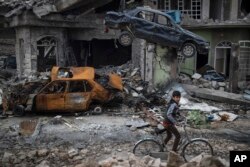U.S. President Donald Trump and Iraqi Prime Minister Haider al-Abadi praised the joint battle their countries are waging against Islamic State, as they held their first in-person talks Monday at the White House.
"Although ISIS/Da'esh remains a dangerous enemy, we are confident it will be defeated," said a joint readout of the meeting, using alternative names for the militant group. "As Iraqi forces consolidate gains against ISIS/Da'esh, the two leaders agreed that the United States and Iraq will pursue a long-term partnership to decisively root out terrorism from Iraq and strengthen the Iraqi military and other key institutions."
Iraqi forces have been battling Islamic State on the ground with the backing of airstrikes from a U.S.-led coalition. The major focus of that campaign right now is an offensive to retake the city of Mosul from the militants who swept into the city in mid-2014.
As Islamic State swept through northern and western Iraq nearly three years ago, Iraqi leaders blamed the military for abandoning their posts and failing to put up a fight against Islamic State, while military personnel accused the government of failing to adequately supply and train the troops.
Trump said at the start of Monday's meeting he hoped to discuss what he called the "vacuum" that resulted.
"We will figure something out. Our main thrust is we have to get rid of ISIS," Trump said.
He also lamented the 2011 withdrawal of U.S. forces from Mosul and the rest of Iraq -- a decision made in 2008 and later implemented by former President Barack Obama after Iraqi and U.S. negotiators could not agree on details for extending an immunity agreement covering U.S. forces and U.S. contractors.
"Certainly we shouldn't have left, we should never, ever have left," Trump said, in comments that followed his suggesting that "perhaps we shouldn't have gone in" in the first place.
Trump also raised the issue of Iran and its nuclear ambitions, questioning why his predecessor, Obama, signed a nuclear agreement with Tehran that lifted a longstanding Western trade embargo against the Islamic Republic.
For his part, Abadi told Trump that his government commands "the strongest counterterrorism forces," but is looking forward to more cooperation with the United States.
Later Monday, Abadi addressed an audience at the independent U.S. Institute for Peace, where he praised the Trump administration for supporting Iraqi initiatives aimed at crushing Islamic State and rebuilding Iraqi cities.
"We have been given assurances that the support will not only continue but will accelerate. I think we are happy with the [White House] meeting ... and we're looking forward to meeting with Congress and others," he said.
Abadi also said a growing number of U.S. companies have shown interest in boosting cooperation in trade, commerce, energy and education. "And we're meeting [with] them today," he said.
Coalition set to meet Wednesday
The Iraqi leader's first meeting with Trump comes as the U.S. administration prepares for a 68-nation meeting later this week of the Global Coalition working to defeat Islamic State. The gathering at the State Department is the first meeting of the full coalition since December 2014.
A U.S. statement said the agenda will target multiple objectives, including counterterrorist financing and the stabilization of areas already liberated from Islamic State control.
During a 2016 visit to Washington, Abadi sought additional financial and military support for the daunting task of rebuilding Iraqi cities ravaged by 14 years of war. He also sought aid to counter a massive humanitarian crisis spawned by the fighting, which has displaced more than 4 million people.
The joint statement from Monday's meeting said U.S. and Iraqi leaders will in the coming months work to deepen commercial times, expand energy sector collaboration and seek new cultural and educational cooperation opportunities.
But the extent of Washington's commitment to providing such aid remains unclear, shrouded by Trump's proposals to cut as much as 30 percent in funding from the budgets of the State Department and the U.S. Agency for International Development.
Both entities focus significantly on international peacekeeping initiatives and development programs.









